*In Dutch a distinction is made between alpha, beta and gamma sciences:
The alpha sciences comprise of human sciences such as philosophy, history, philology, musicology, linguistics, theatre studies, literary studies, media studies, and sometimes even theology. At English speaking universities, they are often called humanoria. The beta sciences are the natural and technical sciences. The gamma sciences refer to the sciences concerned with society and behaviour: sociology, anthropology, public administration, economics, law, political science, psychology and communication science, but also Human Geography among others.
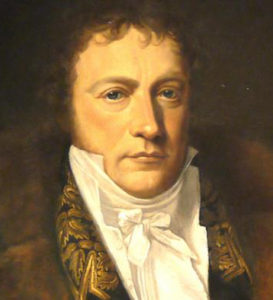 On Saturday Sept. 21 Bas Heijne published the following very telling opinion article in the Dutch newspaper NRC as a reaction on one of the newest irascible ideas of the minister for education. One would expect that this opinion is a truism, for those who have seriously reflected on the role of academia and formation in general in the current times. It is a strange fact that such unreflected ideas emerge since Wilhelm von Humboldt invented the idea of modern universities already in 1810. Below my own free translation of this opinion article:
On Saturday Sept. 21 Bas Heijne published the following very telling opinion article in the Dutch newspaper NRC as a reaction on one of the newest irascible ideas of the minister for education. One would expect that this opinion is a truism, for those who have seriously reflected on the role of academia and formation in general in the current times. It is a strange fact that such unreflected ideas emerge since Wilhelm von Humboldt invented the idea of modern universities already in 1810. Below my own free translation of this opinion article:
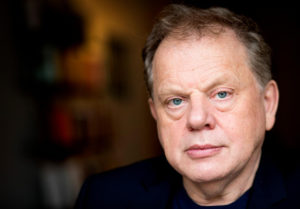 Transfer money from ‘useless’ alfa studies to ‘useful’ beta studies? Fortunately, the universities do not allow themselves to be played off against each other, Bas Heijne observes:
Transfer money from ‘useless’ alfa studies to ‘useful’ beta studies? Fortunately, the universities do not allow themselves to be played off against each other, Bas Heijne observes:
 Last summer Ingrid van Engelshoven, Minister of Education, Culture and Science, together with an editor of this newspaper took a walk along churches in the eastern part of the Netherlands. It turned out to be a pleasant day. The minister is not religious, but she has something with churches:
Last summer Ingrid van Engelshoven, Minister of Education, Culture and Science, together with an editor of this newspaper took a walk along churches in the eastern part of the Netherlands. It turned out to be a pleasant day. The minister is not religious, but she has something with churches: ‘If you are in a church, and you can light a candle, I will do that. It’s always completely quiet, a moment of total tranquillity’.
‘If you are in a church, and you can light a candle, I will do that. It’s always completely quiet, a moment of total tranquillity’.
For the preservation of Dutch heritage, and churches, in particular, she has earmarked 325 million Euro. Those churches are more and more deserted or are already out of use, but for this minister they have more than just a religious meaning – they tell us who we are.
As a child who grew up abroad and felt like a stranger in the Netherlands, she herself also was in need of such a story: ‘Why is this place as it is? And now, I think that is a very fascinating question, for myself, to dig into, but also for a society, for a society with many newcomers. If we want to be able to explain why we do things the way we do, we have to tell a story about our history. And there is nothing that tells a story as well as objects: an image, a painting, a building, a church building. That’s what makes heritage so incredibly meaningful’.
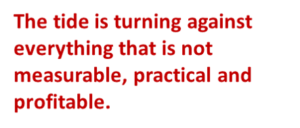 The irony, the travesty, the godforsaken scandal, or whatever you want to call it, is that it is precisely this minister who wants to dismantle these academic disciplines which study this ‘story’ even further, by taking money away from the alpha and gamma studies and transferring it to technical studies. The Netherlands does not educate enough engineers, that is a problem; we are lagging behind if you compare us with other countries. But we had to shift money between the different realms sciences within the framework of the existing budget, so this business is dealt with ‘quick and dirty’, as the minister herself puts it.
The irony, the travesty, the godforsaken scandal, or whatever you want to call it, is that it is precisely this minister who wants to dismantle these academic disciplines which study this ‘story’ even further, by taking money away from the alpha and gamma studies and transferring it to technical studies. The Netherlands does not educate enough engineers, that is a problem; we are lagging behind if you compare us with other countries. But we had to shift money between the different realms sciences within the framework of the existing budget, so this business is dealt with ‘quick and dirty’, as the minister herself puts it.
Quick and dirty – that’s a completely different language than the philosophical drivel about the meaning of the church in the Dutch landscape (‘A church is a beacon, an anchor point’) An image, a painting, a building, a church building ‘tell’ nothing by itself. Not if you don’t know anything about it, not if you don’t delve into it, not if you don’t know history and context. It is we ourselves who tell the story about these objects, we allocate meaning to them, we hold them up to the light, examine them, cherish them and relate them to other stories. The disciplines that deal with that story have a name: The humanities.
Heritage is ‘so incredibly meaningful’. But heritage is not lighting a candle in a quiet church, it is not a safe, cultural enclave in which the past is forever buried in a showcase, with a small sign telling what it is. Heritage doesn’t consist of objects and buildings that you only have to upkeep to preserve their meaning.
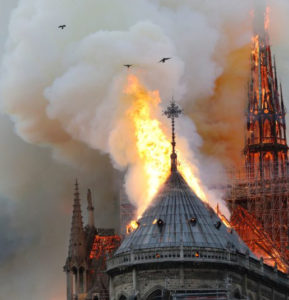 Look at the fierce debates that followed the fire at Notre-Dame in Paris. Nobody will claim that the cathedral is just a careless pile of stones. But what is Notre-Dame, then? What does the cathedral “tell” us? Is the wounded heart of Catholic France, a Gothic masterpiece, a symphony of beauty, a romantic fantasy, thanks to Victor Hugo and Disney? Or is the battered church, in the words of the Catholic Schöngeist Antoine Bodar, “a symbol of a humanity that has declared God as superfluous”? Why does one think it’s funny when an architectural firm proposes to make a parking lot or a swimming pool on the new roof and does a pessimistic (cultural) Christian see this as a sign of miserable decay?
Look at the fierce debates that followed the fire at Notre-Dame in Paris. Nobody will claim that the cathedral is just a careless pile of stones. But what is Notre-Dame, then? What does the cathedral “tell” us? Is the wounded heart of Catholic France, a Gothic masterpiece, a symphony of beauty, a romantic fantasy, thanks to Victor Hugo and Disney? Or is the battered church, in the words of the Catholic Schöngeist Antoine Bodar, “a symbol of a humanity that has declared God as superfluous”? Why does one think it’s funny when an architectural firm proposes to make a parking lot or a swimming pool on the new roof and does a pessimistic (cultural) Christian see this as a sign of miserable decay?
We tell that story – or rather, those stories. To be able to tell them, we need to know the history of the cathedral, the religious thoughts that underlie it. The debate about the restoration – are we simply turning that nineteenth-century spire into another nineteenth-century replica, or are we turning it into something new? – is a sociological-cultural debate. Humanities, then.
Engelshoven’s reputation at the universities is bad, and rightly so; she professes with her mouth a conviction that contradicts her policy. It is also the deathblow to the credibility of her party, The party that traditionally supports education, D66, where, anyhow, great ideas rarely turn out to be firm beliefs.
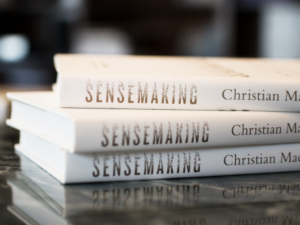 But let’s be honest, this minister is just a symptom, she only moves hand in hand with the spirit of the times. The humanities are under pressure everywhere. In his book Sensemaking: The Power of the Humanities in the Age of the Algorithm (2017) Christian Madsbjerg, consultant and advisor to large companies such as Ford, Adidas and Chanel, describes how the tide has turned in society against everything that is not measurable, practical and profitable: ‘the humanities – disciplines that explore cultural products such as literature, history, philosophy, art, but sometimes also psychology and anthropology – would no longer serve ‘social needs’ ’.
But let’s be honest, this minister is just a symptom, she only moves hand in hand with the spirit of the times. The humanities are under pressure everywhere. In his book Sensemaking: The Power of the Humanities in the Age of the Algorithm (2017) Christian Madsbjerg, consultant and advisor to large companies such as Ford, Adidas and Chanel, describes how the tide has turned in society against everything that is not measurable, practical and profitable: ‘the humanities – disciplines that explore cultural products such as literature, history, philosophy, art, but sometimes also psychology and anthropology – would no longer serve ‘social needs’ ’.
The spirit of the humanities has been replaced by a technological worldview. Madsbjerg: ‘For what is the value of a human-centred cultural approach compared to an endless stream of information that is now available via big data? What is the value of reading ground-breaking novels if algorithms can ‘read’ them all and give us an objective analysis of their content? What value lies in theatre plays, paintings, historical studies, dance, political discourses and ceramics, in short, in cultural knowledge that cannot be detached from its specific context and cannot be processed in huge information locks’?
Madsbjerg is not part of the university, he makes – I suppose – huge amounts of money with his consultancy work. His plea for the importance of the humanities cannot be dismissed as a transparent sermon for his own parish, from someone who fears for his job. He also avoids the evangelistic tone, which is as quickly exalted when it comes to immaterial values Exaltation through the appreciation of what has no economic or measurable societal use. Such begging, defensive argumentations have no effect on deaf politicians and policymakers.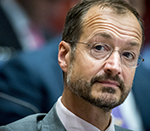
Eric Wiebes, Minister of Economic Affairs, last week in Het Financieele Dagblad: ‘Do we still have to teach French and Greek? Are we going to beat the Chinese with that in twenty years?’
For Madsbjerg especially the humanities are very useful – not so much to become a better and more civilized person, that’s just a by-catch for him, but mainly because one can make a good amount of money with them. Ceo’s of companies that are going to do business in another country, China, for instance, would be better off studying Chinese culture and history and adjust their strategy accordingly. If you want to run your business well, you’d better get some human knowledge, and for that, a novel by for example Balzac helps you more than just another questionnaire evaluation.
Instinct, discernment, empathy, insight into differences, an eye for details that turn the overall picture upside down – are you listening Wiebes? – to develop a sense of all that, you need the arts and the humanities. The human being is a technical being, but technology doesn’t make us human. Not yet.
The humanities don’t just ‘tell’ you things, they make you watch differently. Leave all reports and data for what they are, Madsbjerg suggests, read, think, wonder, study. So that your company is better organised, your employees are more satisfied, you better understand what your customers are waiting for.
No wonder that so many people in high positions in society have done a ‘senseless study’. Madsbjerg: ‘Before you laugh at your daughter for wanting to study Confucian philosophy, or before you look down on people who do a major in French poetry, realise that it can very well be, that you will be working for someone with such an education. Do not be surprised if the chairman of the board of directors or the manager is someone who has studied history, is in love with Slavic languages or specialised in Greek. Of course, if your son loves mathematics, encourage him to enter the world of sciences. But keeping yourself or your children away from the humanities […] doesn’t make much sense – neither for them nor for the future of society’.
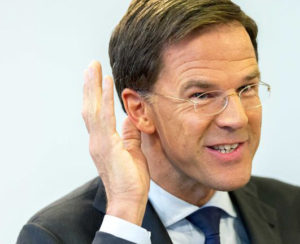 Hey, actually, Madsbjerg here says the same thing as our prime minister did the other day during a relaxing moment at Lowlands. Prime minister Mark Rutte: ‘Watch out for what they call ‘useful’ studies. That will not be successful if you don’t really like it’.
Hey, actually, Madsbjerg here says the same thing as our prime minister did the other day during a relaxing moment at Lowlands. Prime minister Mark Rutte: ‘Watch out for what they call ‘useful’ studies. That will not be successful if you don’t really like it’.
Well, but nevertheless continue cutting the budgets for these sciences. But Rutte certainly has a point. Our prime minister is a historian. Eric Wiebes, the dud of this government, studied at the technical university in Delft.
Sensemaking, that’s what it’s all about, according to Madsjberg. Facts say nothing if you don’t give them meaning. You can be scornful about the blatant way in which the consultant turns the humanities into tools in a neo-liberal, purely profit-maximising society. You can even say it’s dangerous, just as dangerous as wanting to demonstrate the importance of art to society by purely and simply pointing out the economic effects of a rich cultural life – look at the turnover of restaurants near a theatre!
And what if it isn’t profitable for once if there’s money to pay for it?
What is nice, however, is that Madsbjerg removes the humanities from the domain of irrelevance, the cramped enclave of so-called ‘fun studies’. I find that a relief.
 My example: take the merger of KLM and Air France. What a misery (and money) one could have saved if one had studied each other’s history and culture beforehand! They seem to be similar companies, airlines. Technically, their planes are the same, no matter if the labelled as KLM or Air France. But both companies turned out to be completely different because one is French and the other Dutch. Business management, personnel policy, relationship with politics, all of this is heavily influenced and determined by elusive, poorly measurable factors. And these are precisely the factors that the ‘fun studies’ are concerned with.
My example: take the merger of KLM and Air France. What a misery (and money) one could have saved if one had studied each other’s history and culture beforehand! They seem to be similar companies, airlines. Technically, their planes are the same, no matter if the labelled as KLM or Air France. But both companies turned out to be completely different because one is French and the other Dutch. Business management, personnel policy, relationship with politics, all of this is heavily influenced and determined by elusive, poorly measurable factors. And these are precisely the factors that the ‘fun studies’ are concerned with.
Or take the attitude of many citizens towards KLM as ‘national pride’. Or the chauvinism with which the French look at the Netherlands, and vice versa. If you don’t have an eye for that, if you don’t immerse yourself in it, you’re asking for trouble. And trouble they had, and have not disappeared yet. When it’s about utility, it’s almost always about what’s useful for the economy, rarely about what’s useful for society. Humanities are useful for both.
Fortunately, everything now points in the direction that universities do not allow themselves to be played out against each other by this government. Most of them do not intend to take money away from alpha and gamma studies, because they realise that the social importance of alpha studies has in fact only increased in recent years.
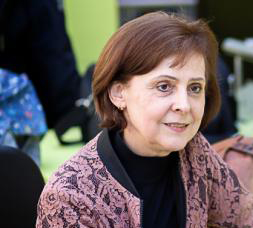 ‘We think it’s a bad idea to take money away from alpha and gamma studies,’ says Karen Maex, rector of the University of Amsterdam in the newspaper NRC. ‘Especially now that we’re facing major social challenges. The impact of innovations is enormous, it’s important that you look at them from all different disciplines. Think of the energy transition or artificial intelligence”.
‘We think it’s a bad idea to take money away from alpha and gamma studies,’ says Karen Maex, rector of the University of Amsterdam in the newspaper NRC. ‘Especially now that we’re facing major social challenges. The impact of innovations is enormous, it’s important that you look at them from all different disciplines. Think of the energy transition or artificial intelligence”.
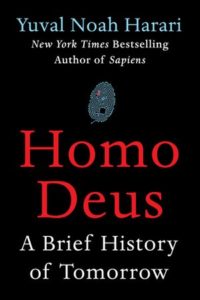 What is more valuable, Yuval Noah Harari wonders at the end of his worldwide bestselling Homo Deus, ‘knowledge or consciousness?’ Who we are, how we look at ourselves and others, how our minds work, how we deal with new technology, how we can remain human in a world ruled by big data – these are questions that we increasingly struggle with outside the walls of universities. By playing ‘useless’ alpha and ‘useful’ beta studies off against each other, Van Engelshoven has shown that her cultural blah blah for the stage about ‘the story’ we tell about ourselves is hypocritical. But above all, her policy shows that she has very little feeling for what is really going on.
What is more valuable, Yuval Noah Harari wonders at the end of his worldwide bestselling Homo Deus, ‘knowledge or consciousness?’ Who we are, how we look at ourselves and others, how our minds work, how we deal with new technology, how we can remain human in a world ruled by big data – these are questions that we increasingly struggle with outside the walls of universities. By playing ‘useless’ alpha and ‘useful’ beta studies off against each other, Van Engelshoven has shown that her cultural blah blah for the stage about ‘the story’ we tell about ourselves is hypocritical. But above all, her policy shows that she has very little feeling for what is really going on.
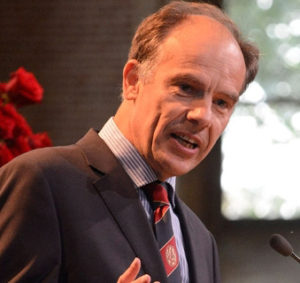 ‘In the seventeen years that I have been a director, relations with the government in The Hague have never been as bad as they are now,’ says Carel Stolker, rector of Leiden University. When the Dutch universities defuse this minister’s policy by ignoring it steely, she’d best go for a very long church walk.
‘In the seventeen years that I have been a director, relations with the government in The Hague have never been as bad as they are now,’ says Carel Stolker, rector of Leiden University. When the Dutch universities defuse this minister’s policy by ignoring it steely, she’d best go for a very long church walk.
So let us think twice and foster academic thinking and education
